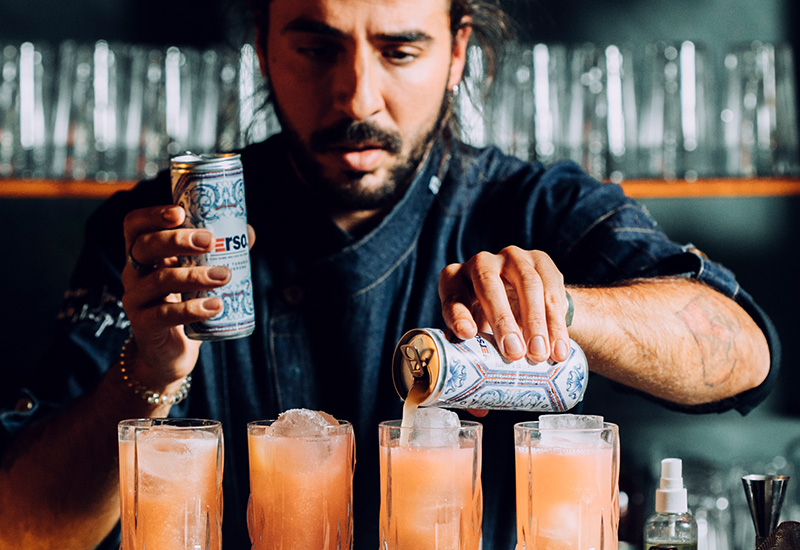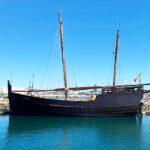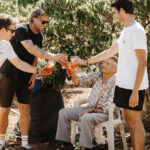Two Algarvian entrepreneurs have used their friendship and the delicious flavours of the Algarve to create an artisan, ready-to-drink cocktail in a can.
Tiago Oliveira and Wilson Pires were childhood friends after meeting while playing football, aged ten. Their friendship continued through high school and when they both attended the University of the Algarve (UAlg). Tiago graduated with a degree in economics, and Wilson, in tourism.
Their paths then separated when they went to get experience abroad. When we spoke, Tiago explained, “We wanted to discover things to make us richer as people.” Tiago first started bar work to pay the tuition fees before entering university. “I started enjoying being behind the bar and working in O Castelo, Faro. I moved to London and started to study at a bar school. Then I went to Edinburgh, joining the most exciting project I’ve been to, a place with the biggest bar laboratory in Europe. It was a phase in which I became interested in the scientific part of the process and managed to put a bit of everything into practice. When I returned to Portugal, I was part of a hospitality training and consultancy company for three years, travelling all over the country teaching bartenders.”
Wilson was a musician in the band Fora da Bóia during his time at university. When he finished his course, he worked as a bartender for the NoSolo Grupo, then spent seven months on cruises before working at the Conrad Algarve. “That’s when I became more interested and participated in the first competitions. In 2014, I won the Bartender of the Year award in Portugal. In 2015, I went to the Netherlands as a bartender at the Waldorf Astoria, a 5* Hotel in Amsterdam. I moved to the street bar Tails and Spirits, which at the time was listed amongst the 50 best bars in the world.” Wilson then moved on to São Paulo, Brazil, working at the Guilhotina Bar. Later, he travelled to Argentina and worked in a bar called Floreria Atlântico, which was number three in the world and is currently number five.
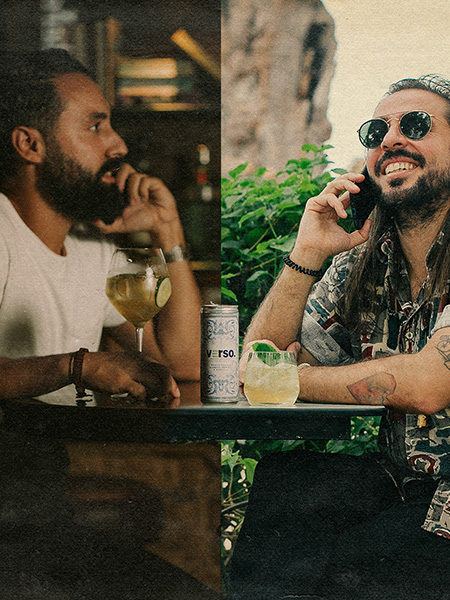
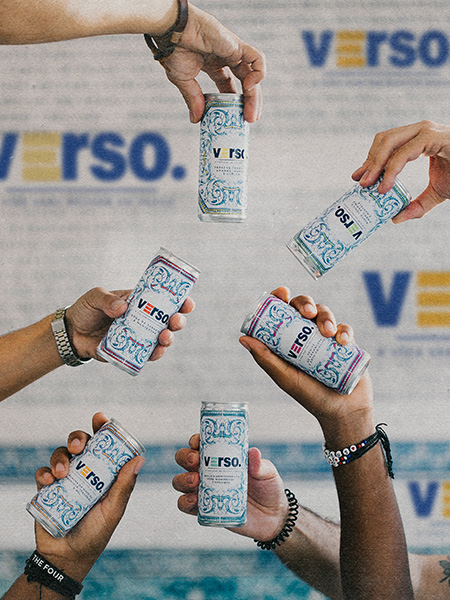
These combined formative experiences around the world gave the pair the know-how to structure the idea of a new drink. During the lockdown, they decided to become business partners and put their knowledge, strengths and friendship together into a project. Verso. was born.
With Wilson in Buenos Aires and Tiago in Portugal, they started to share remotely some ideas about cocktails brands they had seen around the world and to research what was possible in Portugal. Their knowledge about drinks, along with their desire to learn, gave them the vital ingredients to start their own business.
When travel restrictions were lifted, Wison decided to stay in Portugal, so they started to put more energy into the idea and they took a leap of faith to create an enterprise. “We were inspired by Microsoft and started our business in a garage,” jokes Tiago. In the beginning, they entered into a partnership with a group called Call In, which gave them some support to get started.
The pair faced a lot of challenges. The first was the complexity of creating a beverage in a can rather than behind a bar. “We had to learn about carbonisation and the processes they don’t use in a bar,” recounts Tiago. As it’s a pioneering product in Portugal, the beginning of the project took longer than the partners expected: “More than creating a company, we wanted to create it with something that didn’t exist on the Portuguese market. The cocktail terminology existed, and canned drinks also, but not the fusion of the two.”
Verso. buys alcohol as a raw ingredient which they add to their cocktails. They also try to keep the alcoholic content low and concentrate on flavour rather than getting people drunk! All varieties have around five per cent alcohol content, similar to craft beer, and are handmade using mostly local ingredients, except for the pineapple.
Their USP was always to use fresh products with no colourant or flavour enhancers, but, to do this, they needed to learn how to manipulate the products in a new way. For example, in order to use grapefruit in their soda, they discovered it changes colour three times a year as the fruit changes from vibrant red to yellow. But it is always delicious. Tiago tells me, “We only work with what God creates and we try to respect nature, so we extract everything with different flavours and techniques. Because everything is natural, it only has a shelf life of one year.”
Their flavours rely on the ancient technique of fermentation. For example, in their Poncha, they ferment honey with passion fruit and then, in the final phase, they add fennel. This gives it a flavour reminiscent of absinthe, with a touch of tangerine and orange, all freshly squeezed by hand. “The fermentation is largely responsible for the lengthening of the flavours you feel, the complexity, the body and bringing more volatile aromas as soon as you open a can. We don’t add sugars. What happens is that, in fermentation, there is an exchange of sugars for other elements, such as carbon dioxide and different types of acidity,” explains Wilson.
Verso. also tries to use products from local producers, such as oranges, and in some cases, they actually pick the ingredients themselves. They grow their own aromatic herbs. Their raspberry producer is a friend from school and they pick the fruit from her farm. So their product can be described as ‘field to fork’ (or in this case, ‘farm to can’), which they believe helps the local economy and make them more sustainable. “Many people see glass as a more elegant receptacle than a can, but we think cans are better as 90% can be recycled. Glass takes a lot of energy to recycle and is heavier to transport. We also believe that a can is a better alternative to conserve the product.”
Their non-alcoholic cocktails have also had great feedback from their clients. Tiago tells me, “It is easy to create a complex flavour with alcohols with a beginning, middle and end with different flavours. It is not so easy with non-alcoholic drinks. We believe that our non-alcoholic drinks have a quality and complexity and volatility akin to wine.” Their Tepache cocktails are created with an ancient technique of stabilisation and conservation of the pineapple through fermentation. In the last phase, mango and hops are added. “The idea was to make a non-alcoholic beer. Basically, an IPA [India Pale Ale] beer, with a very bitter taste but with very tropical touches,” Tiago explains. They believe by using fermented products, their drinks have a greater complexity, better than if they had been distilled.
The partners wanted their brand to have a very Portuguese flavour, reflected in their use of local ingredients but also the distinctive design on their cans, which incorporates a motif of traditional Portuguese azulejos (tiles).
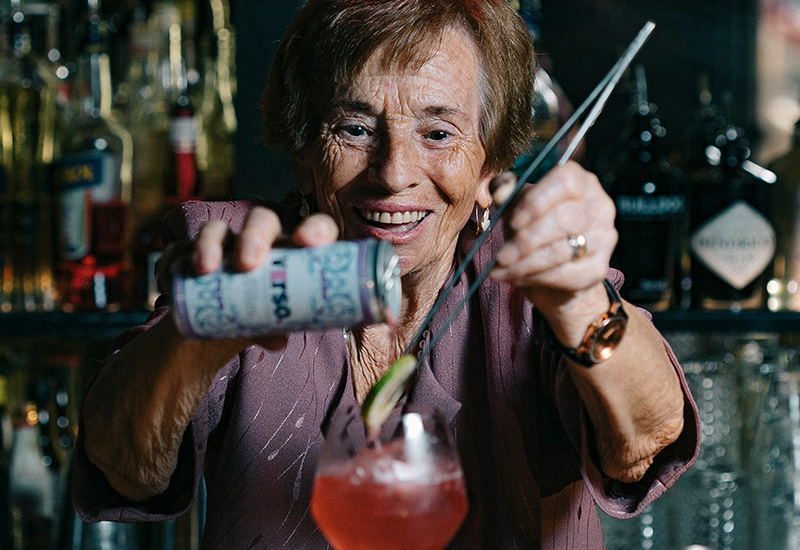
In May 2021, the first cans were ready when they had a call from NOS saying they’d heard about Verso..The telecommunications company ended up being their first client with an order of 400 cans for a corporate event the next day. “It was pandemonium because we were still testing,” recalls Tiago. From the brand’s first order in less than a year, they have sold to the whole country and its archipelagos, gathering momentum through word of mouth.
With some orders coming in from Barcelona and Rome, the business partners hope that next year they can sell abroad, but it is a dream, not a goal. They are happy to remain artisans. Tiago comments, “People like our brand as it is Portuguese. It is about the quality of products which we use when we work with the products. You feel the flavours when you drink it. We respect nature and quality. We have no desire to compromise any of this by trying to be global.”
Wilson adds, “Why does everyone want to open a business and be the next great national or world reference? It’s all very well being ambitious, but why can’t there be many small companies where we can spread the money around, make quality products and all be fulfilled?”
Their goal for 2023 is to double production. Although Tiago trained in economics, he has found the finance side of the business challenging. “There is no support for young people starting businesses. Sometimes money is not the answer, but rather support and guidance. Also, because this business broke new ground, it was difficult to get advice.
Verso. also aims to give a second life to products which otherwise might be thrown away. For example, when they strain raspberry and lemongrass, the waste products still have a flavour which they use to make kombucha. They also save the pulp of ginger from their sangria to make ginger beer. The objective is to reduce the brand’s environmental footprint even further and, at the same time, create a range primarily directed at bar professionals. According to Tiago Oliveira, this second line will be called ‘ReVerso.’ “It is born from products that were going to waste to serve as a base for other cocktails.”
At the moment, they are supported by friends and family, but they don’t have anyone else on the payroll. “Friends volunteer to help as it is engaging for them as they want to be part of this startup as they think one day it might be something big and they want to be part of the story,” says Tiago.
Whatever the future holds, the story of Verso. is indeed compelling. A tale of enduring friendship, travel and ingenuity, with each chapter flavoured by the aromas of Portugal, I am sure the appendix will be equally gripping. Cheers to Tiago and Wilson.
How to taste Verso.
Verso. recommend drinking their cocktails cold straight from the beautifully designed can, which retains the cold and the CO2 or in a nice wine glass with ice.
Mediterranean Sangria with white wine, pear, basil and ginger
Poncha da Madeira with sugarcane spirit, passion fruit, tangerine and honey
Spritz With White Wine, Raspberry, Lime and lemongrass
ReVerso. Port Tonic dry white port infused with juniper berries, cucumber and mint and tonic water
Alcohol-free
Grapefruit and marjoram soda (allows bartenders to make the Paloma, a very popular cocktail at the moment)
Tepache with fermented pineapple, mango and hops
Alcoholic cocktails cost 3.50€ a unit, Tepache 2.50€ and Soda 1.50€.
Orders can be placed directly with the producer, through social networks (@verso.cocktails) and shipped anywhere in the country.
Order them from Instagram, or they can be sampled at Michelin-starred Bela Vista restaurant in Portimão, Palmares and Bon Vivant in Lagos, Club Nau in Ferragudo, NoSoloÁgua in Portimão and Three Little Birds in Sagres. Conrad Hotel, A Venda in Faro, À do Pinto in Faro, Grand Hotel in Vila Real de St António, Red Frog (one of the 50 best bars in the world) in Lisbon and Torto in Porto.
Photos © @tiagomaya_visualarts
